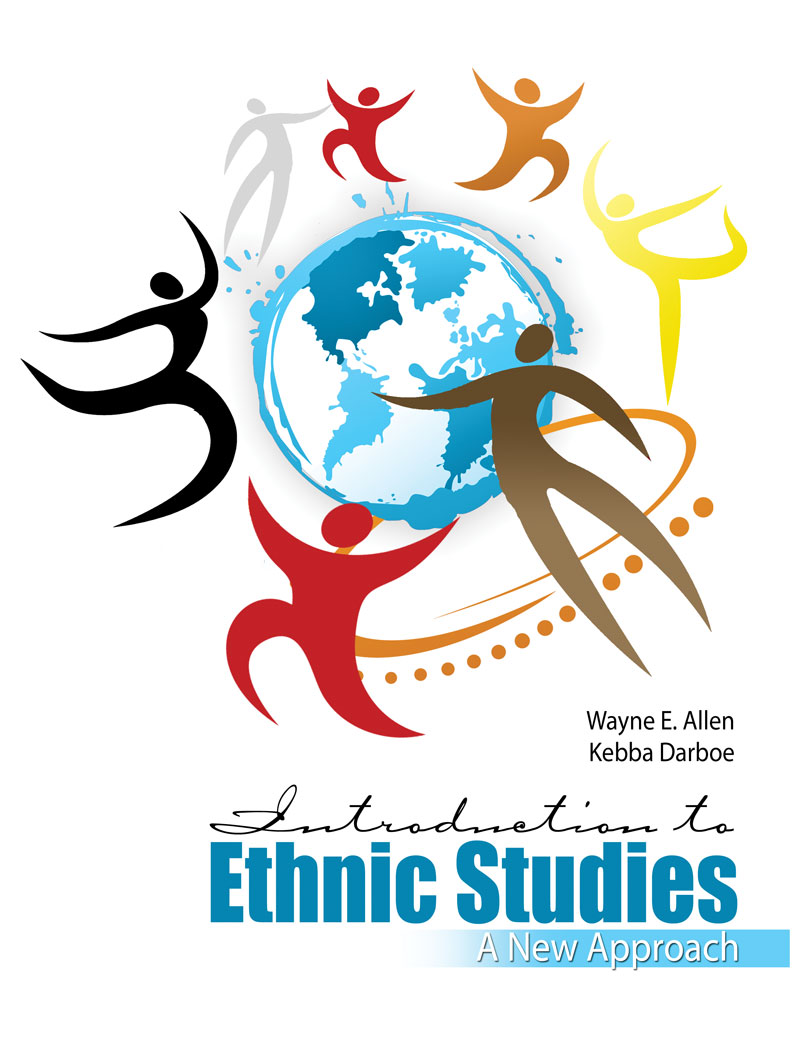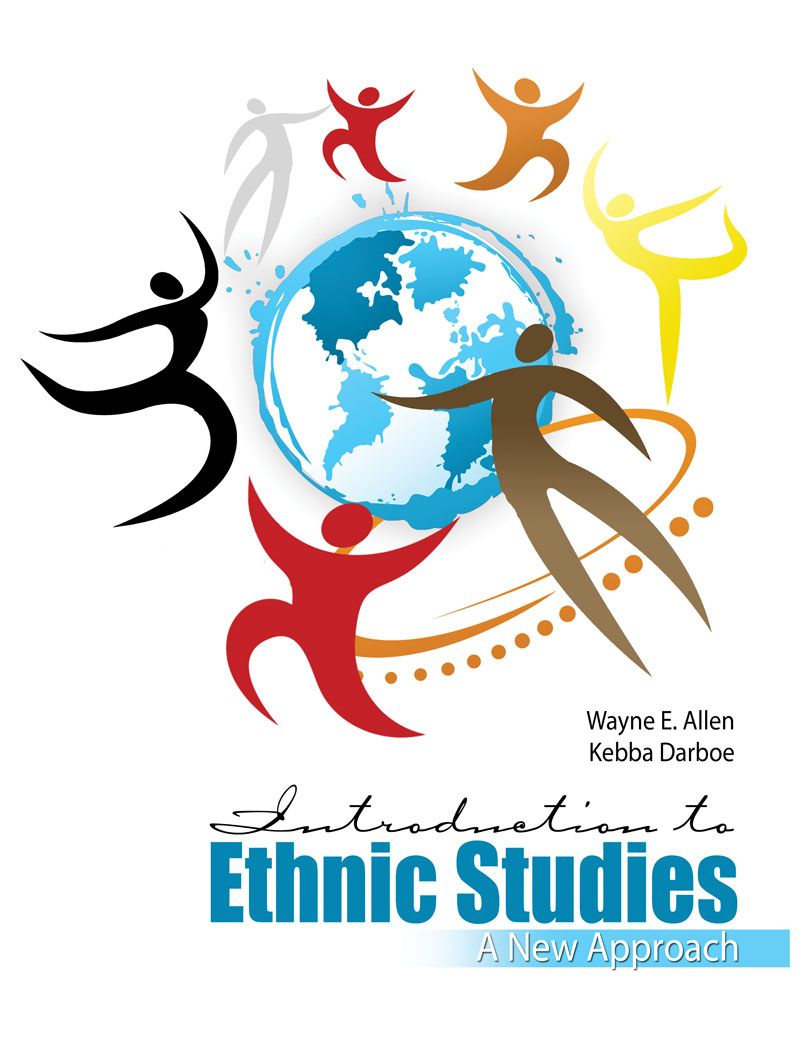Introduction to Ethnic Studies: A New Approach
Author(s): Wayne Allen , Kebba Darboe
Edition: 2
Copyright: 2016
Pages: 260
This book gives students a brief introduction to the discipline of Ethnic Studies, its history, theories, methods and application to real world problems. It starts with a brief historical overview of this relatively new academic discipline and explores some basic definitions and concepts, along with particular theoretical approaches that demarcate the discipline in comparison to other neighboring fields in the social sciences. It employs a new theoretically inclusive approach known as political ecology, which synthesizes theory and methods from adjoining fields such as Darwinian anthropology, evolutionary biology, behavioral ecology, political economy, and evolutionary psychology. As such, political ecology represents a single unified overarching scientific paradigm for understanding and engaging in ethnic studies. The text analyzes, explores and critiques the history of the discipline, as well as the current prevailing methods and theories employed in Ethnic Studies. The reader is presented the theoretical and critical understanding, as well as methodological tools, necessary to begin proceeding in a scholarly manner from mere political advocacy, the standard approach in Ethnic Studies, to applied research in real world settings (or “learning by doing”), and then back again to advocacy.
The text examines theories like sociobiology, evolutionary ecology and evolutionary psychology, world systems theory, dependency theory, postmodern critical theories, and key concepts like social hierarchies and ethnic stratification, ethnic prejudice, ethnic discrimination, ethnic conflict, and race, class and gender, and differences in abilities, age, and sexual preference. It examines in depth the political ecology of the five main levels of social, political and economic organization of human societies and the role of social groups, social categories, and social networks in the rise of imperialism, resource colonialism, and slavery. The reader is shown how ethnic interaction and segregation, often expressed in ethnic conflicts accompanied by racist policies and practices, result from a history of imperialist colonial expansion designed to exploit the natural resources and labor of colonized populations. Readers are taught how to examine and critique contemporary instances of imperialism and resource colonialism by applying their knowledge to current issues and problems of concern within Ethnic Studies.
Terms that are covered in the text include (but are not limited to): proximate, ultimate, ontogenetic, and phylogenetic levels of causation, social groups, populations, social networks and social categories, culture, subculture, counterculture, race, racism, racialization and racialism, ethnicity and ethnic identity, spatial and social territoriality, ethnic boundaries – establishment and maintenance, imperialist states and resource colonialism, ethnonationalism or ethnic nationalism, panethnicity, ethnocentrism, prejudice, discrimination, segregation, marginalization, diversity, sexism, classism, ageism, pluralism, multiculturalism, affirmative action, enculturation, acculturation, assimilation, and self-determination. The text is thus intended to introduce lower-level students to Ethnic Studies, its history, its terminology, and its application to real world issues like ethnic conflicts and identity issues in the world at large.
CHAPTER I Introduction: What Is Ethnic Studies?
CHAPTER II Key Terms and a Much-Needed Critique of the Culture Concept
CHAPTER III A Brief Outlined Overview of Theory in the Social Sciences
CHAPTER IV A Long-Term View of Human Social Organization
CHAPTER V Political Ecology: A New Theory for Ethnic Studies
CHAPTER VI The Age of Exploration: Colonialism and Slavery
CHAPTER VII Slavery, Jim Crow, and the Civil Rights Movement
CHAPTER VIII Historical Perspectives on Affirmative Action, Diversity, and Multiculturalism in U.S. Higher Education
GLOSSARY
APPENDIX A The Learning Portfolio
APPENDIX B Applying Ethnic Studies: The Internship Packet
This book gives students a brief introduction to the discipline of Ethnic Studies, its history, theories, methods and application to real world problems. It starts with a brief historical overview of this relatively new academic discipline and explores some basic definitions and concepts, along with particular theoretical approaches that demarcate the discipline in comparison to other neighboring fields in the social sciences. It employs a new theoretically inclusive approach known as political ecology, which synthesizes theory and methods from adjoining fields such as Darwinian anthropology, evolutionary biology, behavioral ecology, political economy, and evolutionary psychology. As such, political ecology represents a single unified overarching scientific paradigm for understanding and engaging in ethnic studies. The text analyzes, explores and critiques the history of the discipline, as well as the current prevailing methods and theories employed in Ethnic Studies. The reader is presented the theoretical and critical understanding, as well as methodological tools, necessary to begin proceeding in a scholarly manner from mere political advocacy, the standard approach in Ethnic Studies, to applied research in real world settings (or “learning by doing”), and then back again to advocacy.
The text examines theories like sociobiology, evolutionary ecology and evolutionary psychology, world systems theory, dependency theory, postmodern critical theories, and key concepts like social hierarchies and ethnic stratification, ethnic prejudice, ethnic discrimination, ethnic conflict, and race, class and gender, and differences in abilities, age, and sexual preference. It examines in depth the political ecology of the five main levels of social, political and economic organization of human societies and the role of social groups, social categories, and social networks in the rise of imperialism, resource colonialism, and slavery. The reader is shown how ethnic interaction and segregation, often expressed in ethnic conflicts accompanied by racist policies and practices, result from a history of imperialist colonial expansion designed to exploit the natural resources and labor of colonized populations. Readers are taught how to examine and critique contemporary instances of imperialism and resource colonialism by applying their knowledge to current issues and problems of concern within Ethnic Studies.
Terms that are covered in the text include (but are not limited to): proximate, ultimate, ontogenetic, and phylogenetic levels of causation, social groups, populations, social networks and social categories, culture, subculture, counterculture, race, racism, racialization and racialism, ethnicity and ethnic identity, spatial and social territoriality, ethnic boundaries – establishment and maintenance, imperialist states and resource colonialism, ethnonationalism or ethnic nationalism, panethnicity, ethnocentrism, prejudice, discrimination, segregation, marginalization, diversity, sexism, classism, ageism, pluralism, multiculturalism, affirmative action, enculturation, acculturation, assimilation, and self-determination. The text is thus intended to introduce lower-level students to Ethnic Studies, its history, its terminology, and its application to real world issues like ethnic conflicts and identity issues in the world at large.
CHAPTER I Introduction: What Is Ethnic Studies?
CHAPTER II Key Terms and a Much-Needed Critique of the Culture Concept
CHAPTER III A Brief Outlined Overview of Theory in the Social Sciences
CHAPTER IV A Long-Term View of Human Social Organization
CHAPTER V Political Ecology: A New Theory for Ethnic Studies
CHAPTER VI The Age of Exploration: Colonialism and Slavery
CHAPTER VII Slavery, Jim Crow, and the Civil Rights Movement
CHAPTER VIII Historical Perspectives on Affirmative Action, Diversity, and Multiculturalism in U.S. Higher Education
GLOSSARY
APPENDIX A The Learning Portfolio
APPENDIX B Applying Ethnic Studies: The Internship Packet

